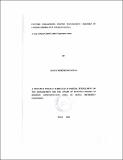| dc.description.abstract | Change management is a common management approach in business organization, the concept has not been fully adopted and practiced in coffee farmer's cooperative unions particularly those whose membership is the primary coffee societies. This study focused on the analysis of factors that influence change management practices in coffee cooperative unions in Kenya. The objective of this research was to assess the factors that influenced the process of change in coffee farmers' cooperative unions. The idea was to investigate specifically how change management was being translated in the management of unions' cooperative based development activities. Thus the study was addressing the factors influencing change practices such as, organization structure, leadership capacity, technology and communication. The researcher used a descriptive research design. The design helped to answer the questions such as how, what, when, and where. Thus the design was suitable to answer the questions concerning the current status of change management practices in coffee cooperative unions. The research focused on Meru central coffee cooperative union limited (MCCCU ltd) which has eighty (80) employees consisting of management and subordinate staff. Meru central coffee cooperative union was used as a representative union for all other unions in Kenya because they all assume same values such as self-help, self -¬responsibility, democracy, equality, equity, and solidarity, as well as ethical values, honesty, openness, social reasonability and caring for others. These values underlie the principles for cooperatives, which are seen as essential to the cooperative spirit in all cooperative unions: Voluntary and open membership, Democratic member control, Member economic participation, Autonomy and independence, Education, training and information, Co-operation among cooperatives and Concern for the community. The study sample was selected from the target population using stratified random sampling method. Simple random sampling was used to take a sample in each group or strata. The study used self-administered questionnaire to collect data. The researcher used drop and pick method to administer the questionnaires. The data was processed and analyzed using the statistical package for social sciences (SPSS). Descriptive statistics such as means of occurrences or central tendencies were used for analysis. A Logit model was used to analyze the data and Omnibus (Chi-square) was used to test the significance of the model coefficients. At-test was carried out to establish the significance of the variables and a logistic regression analysis was used to analyze the data. The results were presented in summary reports, and tables based on those tests and analysis of research dimensions. Research findings were used to conclude on hypotheses where the null hypotheses were rejected and alternative hypotheses accepted at 0.1(10%) level of significance, and recommendations were given concerning those factors that influence change management practices. | en_US |

